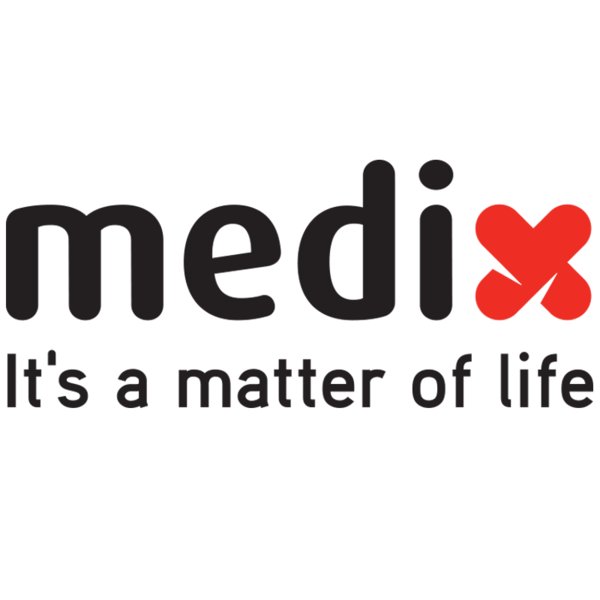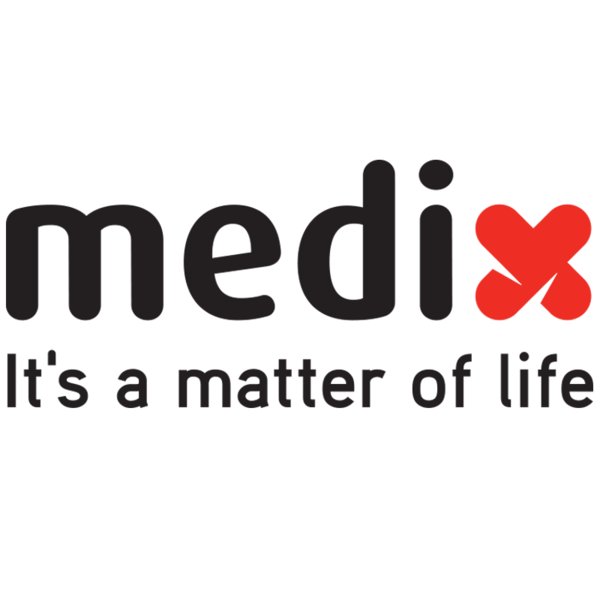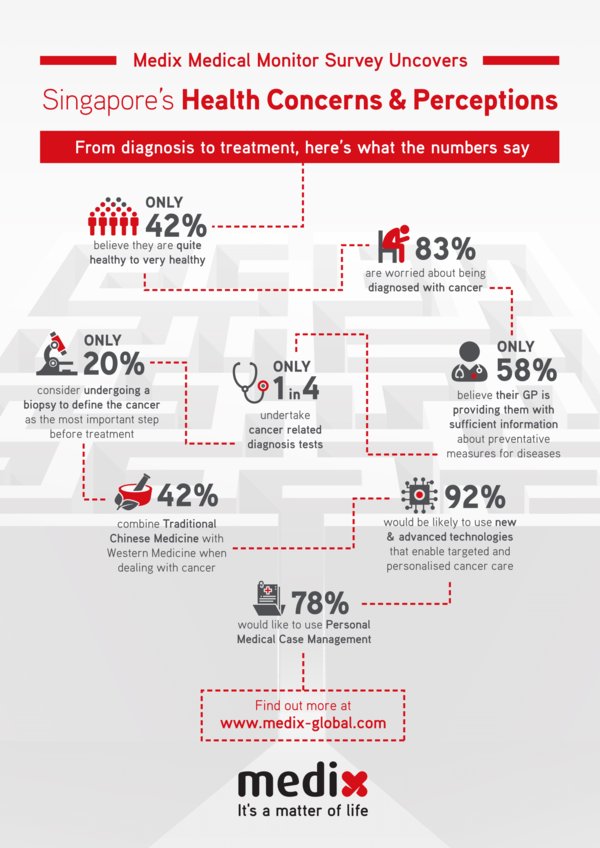 |
Survey shows high fear of cancer, heart attacks and diabetes, with many Singaporeans pessimistic about their health status and unsure of the best place to turn for advice. Demand for personal medical case management, new cancer treatment technologies and personalised diagnosis is high across every demographic.
- Majority of Singaporeans are worried about their health, with only 42% stating they consider themselves quite or very healthy. A significant majority of Singaporeans are worried of one day being diagnosed with cancer.
- Singaporeans are keen to understand more about their health and take proactive measures to prevent developing serious medical conditions, but only 58% believe their GP is providing them with sufficient information about possible preventative measures.
- 60% undergo some general physical examinations, yet only 26% actually undergo any tests that are related to the prevention and/or early diagnosis of cancer, despite this being their biggest fear. For example, of female respondents, only 37% undergo Pap smear and breast examination tests which are known to save lives.
- Disturbingly, when it comes to defining the cancer and choosing the most appropriate cancer treatment, only 20% consider undergoing a biopsy the most important step in the cancer journey, alongside even less (12%) who see staging as a crucial first step, despite both being crucial to improving medical outcomes and survival rates. 92% are likely to use new and advanced technologies that enable targeted and personalised cancer care if made available.
- 42% combine traditional Chinese medicine with Western medicine, and from our experience are doing so without consulting their primary specialist on the potential negative effects of combining both.
- Almost half of Singaporeans believe the choice of a specialist equals in importance to the hospital they will be treated at.
- Most Singaporeans are equally satisfied with the public and the private healthcare system (67% vs. 68%), with lowering costs being their main concern.
- There is a strong interest (78%) in obtaining Personal Medical Case Management services, and 86% would be interested in a multi-disciplinary approach to treatment.
SINGAPORE, Sept. 25, 2018 /PRNewswire/ — A new survey commissioned by Medix has uncovered a range of attitudes towards the diagnosis and treatment of health conditions in Singapore. Across every demographic there is a pessimism towards personal heath and fear around being diagnosed with cancer. Many Singaporeans are proactive with seeking second opinions and undertaking physical examinations, but there is a strong desire for more personalised advice and treatment options.
The study reveals men (53%) are more worried about strokes than women (32%), while cancer is the biggest worry for both, with heart attacks (51%) and diabetes (44%) the next highest concerns. Worryingly, only 58% feel their GP is providing them with sufficient information to prevent diseases. In the case of receiving a severe medical diagnosis, 87% would seek a second opinion.
Residents from all demographics show a strong understanding of the importance of genetic testing (78%) and regular physical check-ups (60%), yet there remains a strong desire for further information and services to prevent serious, medical conditions. 78% state that they would be interested in personal medical case management in the case of a serious illness, and 86% would like a multi-disciplinary approach to treatment. An overwhelming 91% would look for information on new technologies that treat cancer.
When it comes to seeking advice around specialists, less than half (41%) ask their GP for advice, with 14% looking online for recommendations. In regards to the value of specialists, 3 in 4 are confident of the answers provided by them. Surprisingly, 46% feel that the choice of specialist and hospital are of equal importance for the medical outcome. When it comes to satisfaction of healthcare service provision, both the public (67%) and private (68%) sectors are seen of equal importance.
“There is a clear demand for more information around the options available when it comes to healthcare in Singapore. One of the most important steps when tackling health problems is to be as prepared as possible, so preventative measures, regular relevant check-ups, additional medical opinions, and consultations with the right range of specialists is the ideal approach,” said Sigal Atzmon, CEO of Medix. “Knowledge is power, and making educated, objective choices should be Singaporeans priority. Everyone from insurers to doctors to government should be offering the necessary resources to provide these options and ensure that everyone is confident about being able to access them.”
While the survey shows a widespread fear of cancer diagnosis, less than half undergo cancer related prevention and early diagnosis tests. For example, only a worrisome 37% of female respondents undergo breast examinations and/or Pap smears, which are known to save lives. Only 29% of respondents undergo liver function tests, alongside 21% undergoing thyroid function tests.
In terms of the actual treatment of cancer, 42% combine traditional Chinese medicine and Western medicine.
“This is quite worrying as medical literature and research has indicated there can be potentially negative side-effects for the cancer patient when combining conventional Western treatments with traditional Chinese medicine without obtaining appropriate advice,” said Professor David Zeltser, Global Medical Director at Medix. “For example, Asian Ginseng is used in Chinese medicine to prevent cancer and restore strength. However, this induces the activity of CYP3A in the liver, which in turn reduces the effectiveness of many proven chemotherapy drugs. Physicians should be more proactive in obtaining a complete medication history, including herbal medicine use, when advising on suitable courses of treatment.”
Ms. Atzmon, CEO of Medix, added: “The fear of cancer is one of the most striking findings of this survey, especially when you consider it alongside the lack of tests being carried out to diagnose it. The fact that just over half of respondents stated that their cancer was managed by an oncology specialist, despite the clear benefits of doing that is a cause for concern. Another significant concern is around the lack of understanding on which are the most important steps to be undertaken to define your cancer and make an educated choice of treatment. Only 20% understand that undergoing a biopsy is the most important step before treatment, alongside only 12% who see staging as a crucial step, despite both being critical to improving medical outcomes and survival rates. There are some positives when it comes to seeking second opinions, and interest by Singaporeans to use new and advanced technologies in cancer treatment, but clearly more education needs to be done.
Professor Zeltser said the survey results, coupled with Medix’ deep understanding of specialised personal medical case management services, pointed to a very clear set of guidelines to better help Singapore people deal with cancer. These include:
- Conduct screening tests based on your risk profile and family history.
- Insist on a biopsy and staging before starting treatment.
- Seek Oncologist advice and, go for additional medical opinions and apply a multidisciplinary approach. When going for additional medical opinion, or medical case management, retrieve your medical information, as this is crucial for ensuring a quality driven process
- Ask about new treatment options and genetic testing of your tumour to personalise your treatment plan.
- Consult an oncologist before combining TCM with Western Medicine.
Further, Ms. Atzmon called on the Singapore Government to take additional steps to better educate Singaporeans about cancer prevention and treatment, improve accessibility to subsidised cancer screening tests and implement tools to generally reduce cost of treatment in private hospitals, for example, by applying packaged pricing. “There is a pressing need for greater transparency and reporting on treatment provided by the private sector as well,” she added.
The survey was carried out with 600 respondents from diverse backgrounds in regards to income, age and gender. A presentation deck outlining the results in detail can be provided on request.
About Medix Medical Services
Established in 2006, Medix is a global and leading provider of innovative, high quality, medical management solutions. With offices in London, Hong Kong, Shanghai, Singapore and Tel Aviv, and a client base exceeding 3 million members in over 90 countries, Medix offers its clients — primarily global health and life insurers, financial groups, large corporations and government institutions — significant value-added services in the world of healthcare. Medix’ team comprises 300 in-house doctors, as well as nurses, research experts, medical admin teams and an accredited global network of over 3,000 specialists and 1,500 leading hospitals.
Medix is proud to provide its customers with proven better medical outcomes. On global yearly average, Medix has changed the initial diagnosis in over 20% of the cases and improved treatment choices in over 43% of those cases. In Asia, these numbers are even higher. By doing so, Medix provides its customers with fast-track solutions to the right diagnosis and optimised treatment pathways. In over 55% of the cases, unnecessary consultations, tests, treatments and procedures were avoided, which led to significant improvement in overall medical quality, efficiency and cost-management.
Further, Medix also provides disease prevention management services, digital health solutions and medical governance services to insurers, large corporates and government institutions.
Medix is a Shared Value company that strives to enable people around the world to receive the best medical care possible while eliminating unwarranted healthcare variations and helping to control medical cost inflation. Medix believes accessibility, quality and sustainability of medical care are important components of social rights, and is fully dedicated to these activities globally.
About Medix Medical Monitor Research
The Medix Medical Monitor Research was structured to investigate Singapore consumers’ awareness and behaviour towards health issues and cancer. The research data was collected through computer-assisted web interviews of 600 people, who are health insurance policy holders aged 26 to 59 with average or above average personal income. The quotas on gender, age, personal income applied reflect the representation of Medix’ target consumers in Singapore. The research was conducted in August, 2018 by Kantar Millward Brown, a leading multinational market research firm.
Photo – https://photos.prnasia.com/prnh/20180925/2246513-1
Logo – https://photos.prnasia.com/prnh/20180925/2246513-1-LOGO



